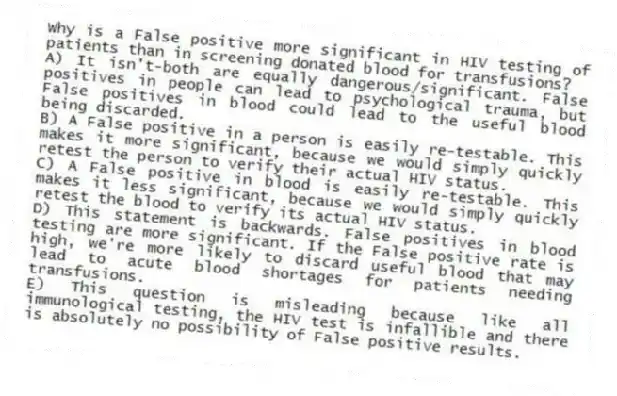
Why is a False positive more significant in HIV testing of patients than in screening donated blood for transfusions?
A) It isn't-both are equally dangerous/significant. False positives in people can lead to psychological trauma, but False positives in blood could lead to the useful blood being discarded.
B) A False positive in a person is easily re-testable. This makes it more significant, because we would simply quickly retest the person to verify their actual HIV status.
C) A False positive in blood is easily re-testable. This makes it less significant, because we would simply quickly retest the blood to verify its actual HIV status.
D) This statement is backwards. False positives in blood testing are more significant. If the False positive rate is high, we're more likely to discard useful blood that may lead to acute blood shortages for patients needing transfusions.
E) This question is misleading because like all immunological testing, the HIV test is infallible and there is absolutely no possibility of False positive results.
Correct Answer:
Verified
Q53: Attenuated agents often give rise to a
Q54: Which of the following methods allows monitoring
Q55: Anti-human-gamma-globulin antiserum is often used in
A) direct
Q56: What would be a primary advantage of
Q57: The effectiveness of DNA vaccines stems from
Q59: An adjuvant has been developed from lipid
Q60: Agglutination reactions utilize particles rather than molecules.
Q61: You are about to graduate as a
Q62: You are about to graduate as a
Q63: Which of the following is NOT True
Unlock this Answer For Free Now!
View this answer and more for free by performing one of the following actions

Scan the QR code to install the App and get 2 free unlocks

Unlock quizzes for free by uploading documents